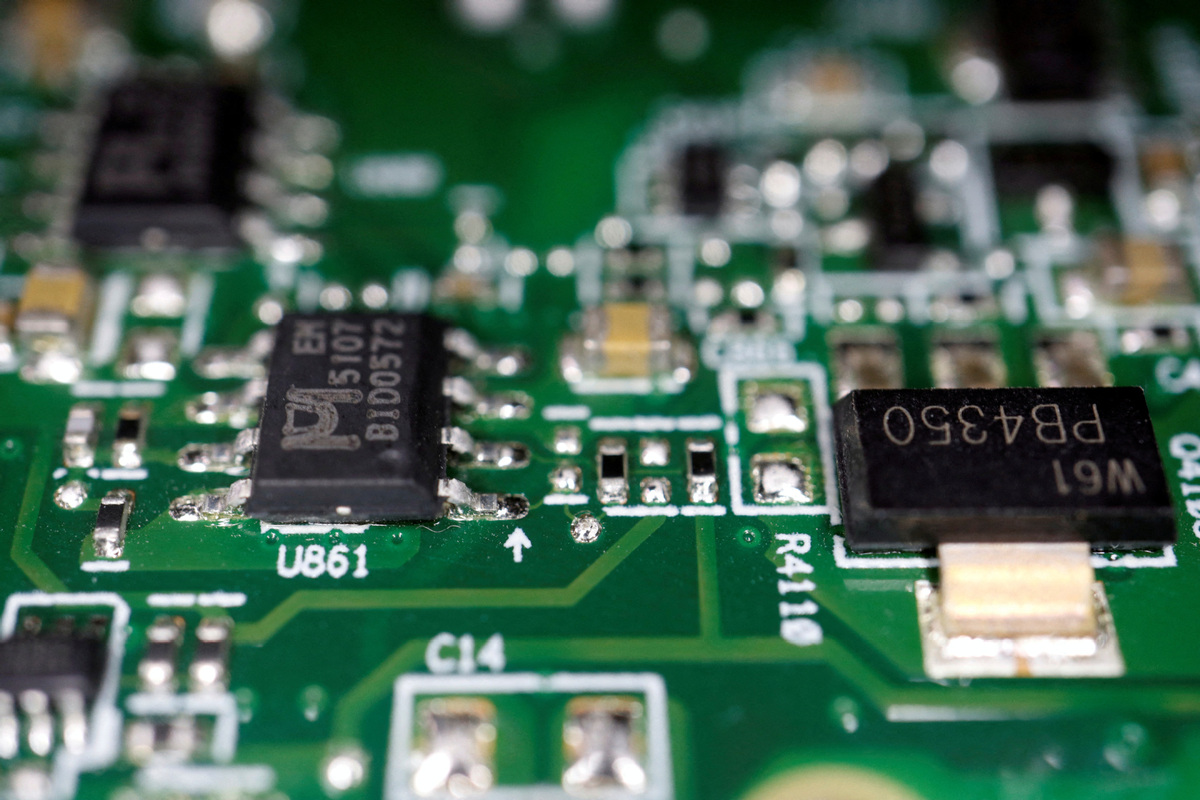
FILE PHOTO: Semiconductor chips are seen on a printed circuit board in this illustration picture taken February 17, 2023. [Photo/Agencies]
The United States is proposing sweeping export controls on advanced computer chips used in artificial intelligence development, a move that industry leaders warn could severely undermine both the competitiveness of US companies and global technological progress.
The framework unveiled by the administration of US President Joe Biden on Monday grants unrestricted access to AI-related chips to 18 close allies while imposing strict licensing requirements on most other nations.
This move represents the Biden administration's latest attempt to further restrict Chinese access to the high-end chips used for cutting-edge AI technology.
While the administration frames the measures as "critical" to preserving US leadership in AI and semiconductor development, the new rule has triggered a furious backlash from the US semiconductor industry.
Industry executives have denounced the regulations as "misguided" and "counterproductive" and potentially devastating to US technological dominance.
Daniel Castro, vice-president of the Information Technology and Innovation Foundation, or ITIF, a leading think tank for science and technology policy, warned of the policy's flaws in a statement on Monday.
"A strategy rooted in competitiveness — not containment — will best serve America's interests in the digital economy of the future," said Castro, who criticized the policy's potential to backfire by forcing international partners to choose sides.
"By pressuring other nations to choose between the United States and China, the administration risks alienating key partners and inadvertently strengthening China's position in the global AI ecosystem," he said.
Castro particularly pointed out the negative impact on US AI companies. "US companies developing proprietary AI models will face stringent regulatory burdens that foreign competitors can evade by leveraging open-source alternatives," he explained.
Market experts have raised additional concerns about the international implications. The restrictive nature of the rules, they argue, could paradoxically strengthen China's position in the global AI chip market. Countries faced with limited access to US technology might increasingly turn to Chinese alternatives, representing the only other viable option in the AI marketplace.
Another group, the Semiconductor Industry Association, has expressed particular concern about the policy being "rushed out the door" in Biden's last days in office.
'Lasting damage'
"The new rule risks causing unintended and lasting damage to America's economy and global competitiveness in semiconductors and AI by ceding strategic markets to our competitors," said SIA President and CEO John Neuffer in a statement on Monday.
The immediate market response has been notably negative, with leading US chip manufacturer Nvidia seeing its stock decline by approximately 2 percent on Monday, following a 9 percent drop over the previous five trading sessions.
Ned Finkle, Nvidia's vice-president of government affairs, strongly criticized the measures in a company blog post, saying, "While cloaked in the guise of an 'anti-China' measure, these rules would do nothing to enhance US security."
"By attempting to rig market outcomes and stifle competition — the lifeblood of innovation — the Biden Administration's new rule threatens to squander America's hard-won technological advantage," he said.
As Finkle noted, organizations worldwide currently leverage mainstream AI to advance healthcare, agriculture, manufacturing, education, and numerous other fields, driving economic growth and development across nations.
"That global progress is now in jeopardy," he warned, as the administration's "unprecedented and misguided 'AI Diffusion' rule threatens to derail innovation and economic growth worldwide".
With the regulations proposed just a week before President-elect Donald Trump's inauguration, Stephen Ezell, vice-president for global innovation policy at ITIF, urged the incoming administration to "immediately withdraw and replace" the policy with "a better approach based upon more extensive stakeholder input and consultation."
liazhu@chinadailyusa.com